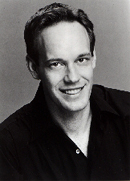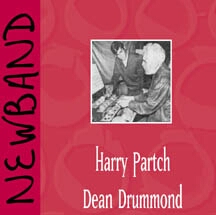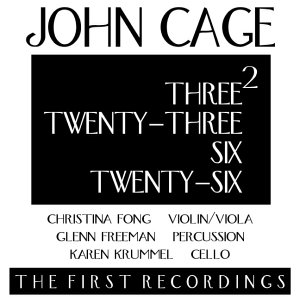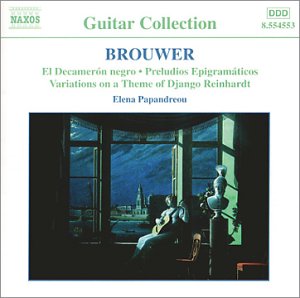 |
|
 |
|
| About Us | Essential
Library |
Read Past Issues | Resources | Composer Links |
|
The
World of
Ruth Crawford Seeger
|
MENDING HIS WAYS? "After several years of criticism that he's been neglecting Canadian composers in favour of heavy doses of Bach, Beethoven and Brahms, National Arts Centre Orchestra Director Pinchas Zukerman yesterday announced an ambitious new program to develop, promote and support Canadian music nationally and internationally." Ottawa Citizen 03/20/02 THE OLD SIDE OF NEW: Contemporary music seems to be performed more and more. But why does so much of it not sound "modern"? Such pieces may be pleasant to hear, but they "don't advance our art; they don't bring it closer to the world outside. They feel, as I've said, like the classical music of the past, and for that reason they don't thrive, or at least their thriving might not do us much good, unless they prepare the way for some new style that feels less like classical music, and more like life." NewMusicBox 03/02 TECH IS NOTHING NEW: Let's not get all carried away thinking that the digital revolution will be the end of music as we know it. Of course music is changing because of technology - it always has - from the invention of the piano to the phonograph... Still...the availability of free music is a compelling change. New York Times Magazine 03/17/02 MUSIC FOR A DESERT ISLAND: In sixty years of choosing recordings they would take with them to a desert island, participants on the BBC's program Desert Island Disks most often prefer Beethoven - specifically the Ode to Joy from the Ninth Symphony. Since the 1960s, the most popular pop music has been the Beatles. The Guardian (UK) 03/17/02 ORDERING OUT: With major labels getting out of the classical music business and smaller independent companies having distribution problems, a growing business in subscriptions holds out some promise. Philadelphia Inquirer 03/17/02 DIFFICULT RELATIONSHIP: "For many years, radio has been, and to a degree remains an important ally for contemporary art music. And while an important conduit for the dissemination of music, it has been problematic at best. The musical arts are among the most conservative, or at least the audience is. The art world embraces the contemporary. Modern art museums are a source of civic pride, galleries specialize not only in modern art, but even in specific styles, genres, and niches. On the other hand, modern music remains esoteric and for the most part, underground, tucked away so as not to upset or annoy anyone within earshot. As a result, it is virtually unheard on television and only begrudgingly allotted a few moments on the radio airwaves, often when few listeners are likely to tune in." NewMusicBox 03/02 GET READY FOR MAHLER, SOTTO VOCE: "A directive being debated in the European Parliament and getting a lot of support around Europe would reduce noise in the workplace, concert halls and opera houses included... The bill calls for a workplace decibel limit of 85 without earplugs, 87 with them. Some members of the parliament, Helle Thorning-Schmidt of Denmark among them, think the directive doesn't go far enough. He is looking for an amendment to lower the level to 83. European musicians are not happy. They say that noise in a factory and the noise of a Bruckner finale are not the same thing... One toot on a trumpet can reach 130 decibels instantaneously." The New York Times 03/24/02 SO WHY ARE THEY PAID SO WELL? When the Vienna Philharmonic visited New York recently, the musicians performed an entire concert without the aid (some would say hindrance) of a conductor. The success of the effort, and countless other similar examples, beg the question of what exactly it is that a conductor adds to a performance that the musicians could not, given the right circumstances, accomplish on their own. And how did the one person on stage not making a sound somehow become the focus of our attention? The New York Times 03/24/02 BOOING FROM THE WINGS: Valery Gergiev is one of those omnipresent conductors who seems always to be in demand and on top of the charts. But the usual backstage grumblings that plague many conductors have hit a fever pitch with Gergiev. Musicians hate him for his indecisive baton, critics complain that he knows too small a slice of the repertory, and administrators despise his chronic lateness and frequent cancellations. So why is he still so famous? The truth may be that competence often has little to do with conducting success, but it is equally true that musical insiders are often disdainful of artists who are popular with the public. The New York Times 03/24/02 THE CRIME OF ACCESSIBILITY: "Philip Glass, who in his hungry years drove a cab in New York, likes to tell the story of the elderly passenger who looked at his taxi licence and informed him that he had the same name as a famous opera composer. That would never happen to Carlisle Floyd, a retired music professor who has had many more performances of his operas than Glass, without a 10th of the renown... Floyd's cardinal sin, in some eyes, is to write music that pleases many and challenges no one. His realistic operas are full of hummable tunes, many of them fashioned after the folk songs he heard while following his father, a Methodist preacher, through the U.S. South during the thirties." The Globe & Mail (Toronto) 03/23/02 EMI LAYS OFF 1800: Recording company EMI is laying off 1800 employees, about 19 percent of its total workers. The struggling music label has been losing money and shedding projects. "EMI has 70 labels and 1,500 artists, including The Beatles, Paul McCartney, Lenny Kravitz, Janet Jackson, Garth Brooks and Pink Floyd." Nando Times (AP) 03/20/02 PIANO COMPETITION "IN THE OLD WAY": The new Rachmaninoff International Piano Competition begins in Los Angeles. Though scaled down from ambitious plans announced two years ago, organizers are bringing competitors from around the world, as well as the Moscow Radio Symphony to accompany performers. And the head of the festival assures fair judging: He "thinks the world of piano competitions is due for an ethical overhaul, comparing the scene with ice skating events at this year's Winter Olympic Games. There are numerous examples of judging controversies in piano competition, including a scene in the 1980 Chopin Competition in Warsaw, Poland, when pianist Martha Argerich stormed off the jury to protest the early elimination of young pianist Ivo Pogorelich." Los Angeles Times 03/20/02 THE WOEFUL STATE OF MOVIE MUSIC: This year's Oscar-nominated film scores are an uninspired lot. "The Academy's choices of warhorse composers over fresh and innovative ones reflect the general deflation affecting the movie score. It's not just that interesting scores aren't receiving the acclaim they deserve—they're simply not being written much anymore. When a director looks for a composer these days, it's usually to write incidental music to be played between the pre-released pop hits that form the real soundtrack of the film." Slate 03/20/02 |
An Interview with Gloria Coates
In 1986, Coates was one of the 10 finalists for the International Koussevitsky (KIRA) Award which honors a living composer for an important work for her composition "Music on Open Strings." She has been the recipient of numerous awards, commissions and distinctions. Coates' music has been performed by leading soloists, ensembles and orchestras such as the Bavarian Radio Symphony Orchestra, Brooklyn Philharmonic, Stuttgart Philharmonic, Milwaukee Symphony, Saint Paul Chamber Orchestra, the London Sinfonia, Polish Chamber Orchestra, various international chamber ensembles including Das Neue Werk Hamburg, the Dresden Ensemble for New Music and the Kronos Quartet. Her work Music on Open Strings, written in1973 for orchestra, was premiered at the Warsaw Autumn of 1978 and proved to be the most widely discussed work on the Festival. In 1979 she was commissioned to write a work for the East Berlin Festival, the first non-socialist composer ever to be performed on it. Some other Festivals include the Dresden Festival, New Music America - New York 1989, Musica Viva Munich, The New York Microtonal Festival, Henze's Festival Montepulciano, Passau International Festival, and the Dartington Festival in England. From 1969 to 1989, Coates lived in Europe where hers was a powerful voice on behalf of American music. She has lectured, written musicological articles, produced and broadcast radio programs, and organized a concert series of German-American music in Munich from 1975 - 1984. Since 1989 Gloria Coates has divided her time between the United States and Europe. In addition to her composition, she is a trained painter and the CD covers featured in this article are photos of her work. Coates'
canon of work includes compositions for orchestra (13 symphonies), chamber
(7 string quartets) and solo music, vocal (a song cycle on poems by Emily
Dickinson), choral music, live electronic and music for the theater. Her
string quartets 1, 5 and 6 have just been released on Naxos CD.
S21: You are best-known for your symphonies. How do you decide what constitutes a symphony? What elements must a work contain to be a symphony rather than, say, an Essay as Barber sometimes called his pieces)? Does your definition somehow relate to Mahler's idea that a symphony is a work that contains everything it takes to make a "world?" GC: It was never an intention of mine to write a symphony, although since 1973 I had written quite a number of orchestral works with three or four movements, always changing the titles and never being satisfied. Sometimes they would be related to the structures such as "Music on Open Strings" and sometimes to the emotional content such as "Illumination in Tenebris." Finally in 1990, all titles seemed totally unfitting to a new orchestral work which lasted a half hour and had 52 instruments playing simultaneously. This was a very serious work and had used various structures that I had developed over many years in a new way, and it seemed heavier in comparison to my other compositions.
Classical Grammy Winners
 |

Dead Man Walking Composer: Jake Heggie Conductor: Patrick Summers Performer: Susan Graham, Frederica von Stade Ensemble: San Francisco Opera Chorus and Orchestra Wea/Atlantic/Erato - #86238 No "Nixon in China" or "Einstein at the Beach" but young Heggie has a way with melody and this debut opera suggests there may be better things to come. |
A Prole do Bebe No. 2, Cirandinhas Composer: Heitor Villa-Lobos Performer: Sonia Rubinsky Naxos - Flat out fantastic. Rubinsky makes child's play of Villa-Lobos' thornier conceits. If you live in New York, write this down: Sonia Rubinsky will be performing selections from Vol. 2 and the upcoming Villa-Lobos: Piano Music Vol. 3 on March 14th, Thursday, at 6:30 pm at the Klavier-Haus located at 211 West 58th St. |
Music for the Movies Alfred SCHNITTKE (1934-1998) Composer: Alfred Schnittke Conductor: Frank Strobel Ensemble: Rundfunk-Sinfonieorchester Berlin, Rundfunkchor Berlin Cpo Records Schnittke regarded film music as a legitimate expressive medium and wrote more than sixty film scores and worked with the prominent directors of his day. This collection demonstrates that he understood film composition thoroughly and considered it a new vista for his creative work. |

NEWBAND Composers: Harry Partch, Dean Drummond Innova 561 Works by former cohorts and microtonal pioneers, Harry Partch and Dean Drummond. This stunning new recording is performed by members of Newband primarily on the original Partch collection of hand-made instruments, notable for their sculptural and acoustic beauty. The music integrates declaimed poetry (masterfully performed by Bob Osborne) with colorful instrumental accompaniment. The Drummond pieces are first recordings, the Partch are the first since the 1940s. |
|
Preludes & Fugues for 13 solo strings: Three Postludes; Fanfares Composer: Witold Lutoslawski Conductor: Antoni Wit Naxos - #8555270 A treasure trove of Lutoslawski's "little" works, with lots of delightful listening for even those not fully committed to 20th century work. |
Passacaglia, Symphony, Five Pieces Passacaglia, Symphony, Five Pieces Composer: Anton Webern Conductor: Takuo Yuasa Ensemble: Ulster Orchestra Naxos Who knew that the Second Viennese School could be so...listenable. Has the music changed or have our ears adapted to the atonality? |
Concerto for Strings Composer: Joly BRAGA SANTOS Performer(s): Braga Santos, Creswick, Somov, Blair, Cassuto Marco Polo - Joly Braga Santos is one of the most interesting and gifted composers of the 20th century--and one of the most unknown. His musical language is based on a strong sense of architecture and drama, with generous melodic lines and a natural instinct for structure and formal coherence. If you don't know the work of this 20th century Portugese master, grab it. |
Symphony No. 1 Composer: George Barati Conductor: Laslzo Kovaks, Vladimir Valek Ensemble: Budapest Symphony Orchestra, Czech Radio Symphony Orchestra Naxos - The First Symphony was written in 1963 during a stay in Switzerland. Set in three movements, it is packed with musical incident. The Chant of Darkness was composed in 1993 as an expression of the composer’s grief as his daughter lay dying from cancer. The work exhibits a frightening sense of finality. The Chant of Light dates from 1994-5 and is cast in a simple structure, displaying Barati’s love of working with small motivic cells, combined with the use of luscious orchestral color. |

90% Post Consumer Sound Composer: Ellen Band Performer: Adele Armin Ellen Band Band creates 'sound art' from everyday noises with results that sometimes sound celestially musical and sometimes sound like..well everyday noises. |

Three2, Twenty-Three, Six, Twenty-Six Composer: John Cage Performer: Christina Fong, Glenn Freeman, et al. Orchard - #6260 |
String Quartets 1 & 2 Composer: Arnold Bax Performer: Maggini Quartet Naxos - Fresh from the Gramophone Award-winning Naxos recording of Vaughn Williams, the Maggini turn their attention to another English composer of elegiac melodies with superb results. |

Guitar Music, Vol. 2 Composer: Leo Brouwer Performer: Elena Papandreou Naxos - One of the best writers for the guitar alive today, Brouwer combines elements of his native Cuba with jazz and European modernism. Papandreou performs these tricky pieces elegantly. |
|
One-Minute Web Guide The essential guide to intelligent life on the internet |
Publisher: Duane Harper Grant (212) 582-4153 Editor: Jerry Bowles (212) 582-3791 Contributing Editors: Armando Bayolo, Sam Bergman, Joshua Cohen, Karina Cristina Demitrio, Deborah Kravetz (C) Sequenza/21 LLC 2000 |